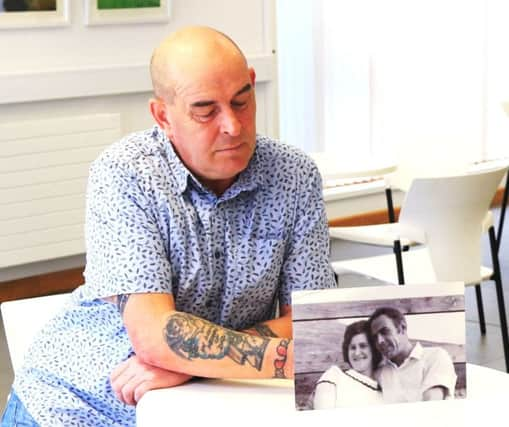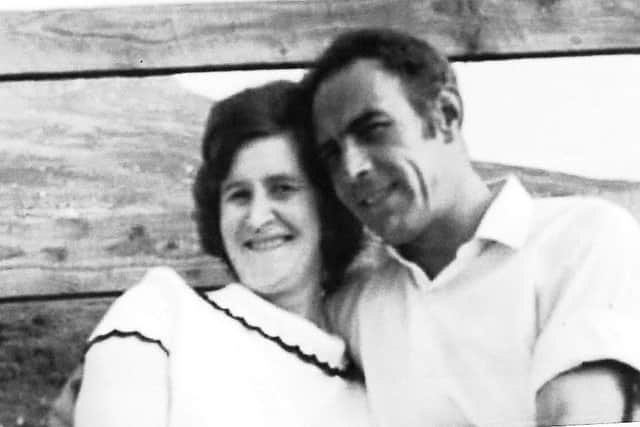Even though we had moved to a loyalist area, the Troubles seemed to follow us


In the 1970s, Philip Cloete’s father, Gerald, was a part-time member of the UDR. Originally from Gillingham in Kent, he first came to the city with the Royal Navy. He was stationed at Sea Eagle and, whilst here, like many men before him, he met his wife to be, Mary Gardiner, who grew up in Carrigans in Co Donegal.
She fell in love with the young sailor from Kent and they were soon married. In the early days of their marriage, Gerald and Mary lived on Asylum Road and later moved with their young family to the Glen Estate on Northland Road.
Advertisement
Hide AdAdvertisement
Hide AdAt that time, the Glen Estate was very much a neighbourhood, housing both Protestants and Catholics. That was all to change as the Troubles gripped the city. Gerald, with his experience in the navy, joined the UDR (established in 1970) and reasonably quickly was promoted to the rank of Lance Corporal. He also secured himself a job at Du Pont where he was a foreman.


As the Cloete family established themselves in the Glen, tensions arising from the Troubles grew. The hooded body of Glen resident and UDR member, David Deacon, was found near the Molenan customs post in March 1973. Rumours continue to circulate that Deacon had been tortured and mutilated before being shot.
Eighteen year old Winston Cross, also from the Glen Estate, was one of two men abducted and shot dead by the IRA in November 1974. The second of these was Joseph ‘Bert’ Slater. He was 29. Their lifeless bodies were found on an isolated country road at Sheriff’s Mountain.
During the early and mid-1970s, the teenage Philip Cloete attended Templemore Secondary School, close to his home. As a young Protestant, he was aware of the tensions in the city following internment and the trauma of Bloody Sunday. Sometimes he and his Protestant mates had running battles with young Catholic teenagers, some coming from the Government Training Centre at Springtown not far from the Glen, some coming from the “old Glen” just across the main Glen Road.
Advertisement
Hide AdAdvertisement
Hide Ad“I grew up beside Winston Cross and his family,” Philip says. “There were five of them, four fellas and one girl and there were five of us - again four fellas and one girl. His brother, Vance, was the best man at my wedding. I was friendly, too, with Paul Deacon, David’s son. These murders certainly affected us.
“Then, on April 6, 1977, my own father was shot and killed by members of the Provisional IRA close to our home at Glenside Park. He was leaving for his work on the evening shift at Du Pont. My daddy was aged 46.”
Philip’s father was the 178th person to be killed in the city area during the Troubles.
He was the 72nd UDR member to be killed since its formation.
Advertisement
Hide AdAdvertisement
Hide AdPhilip adds: “Within weeks of my father’s murder, we had moved to Nelson Drive. Here, in Sperrin Park, there is a squad of us who all moved over from the Glen. And even though we were now living in a loyalist area, the Troubles, you could say, followed us.
“A year or so after my daddy was murdered, young Robert Struthers from the Glen was shot dead at Lorne Electric. Robert was a quiet lad.
“Then, a few years later, I was to witness the terrible shooting of John Olphert in his own shop in Nelson Drive. John had already resigned from the police where he had been a reserve constable.”
Philip will share his personal story of the Troubles at an event at the Holywell DiverseCity Community Partnership, Bishop Street (Londonderry) on Wednesday, June 12 (12.30pm).
Advertisement
Hide AdAdvertisement
Hide AdHe will invite the audience to understand the impact his father’s tragic loss had, first and foremost, on his mother, Mary, on his siblings and himself.
Towards Understanding and Healing welcomes Philip and applauds his courage in sharing his story.
This can’t be easy to do and, yet, Philip is stepping forward and taking that risk.
All of the testimony events to date have been characterised by respectful, supportive listening.
Advertisement
Hide AdAdvertisement
Hide AdSuch listening can enable the growth of an understanding that might not have been present before.
If you would like to attend (and for catering purposes), contact Kirstie Wright to register at [email protected] or on Tel: 02871 261941.